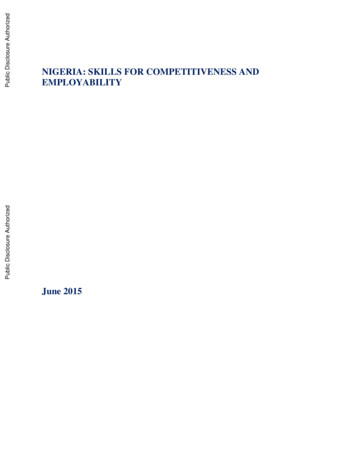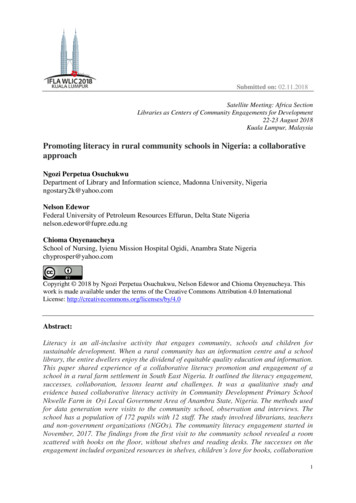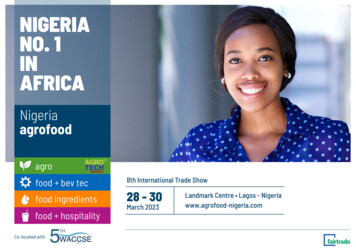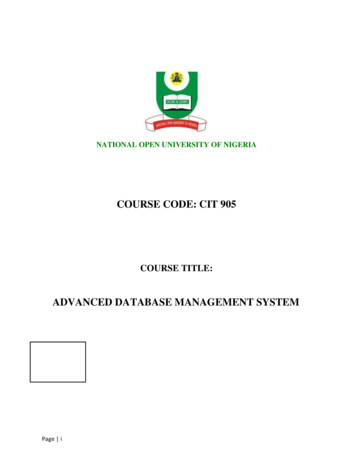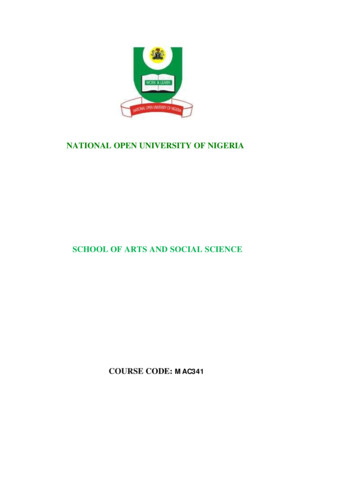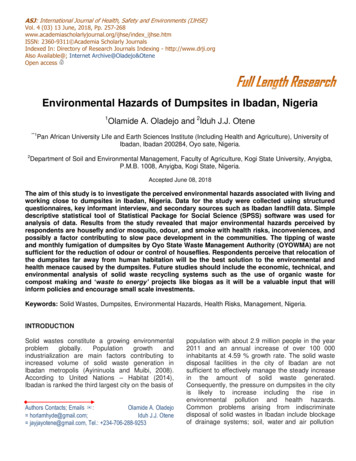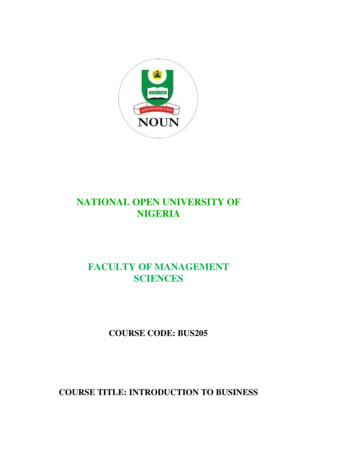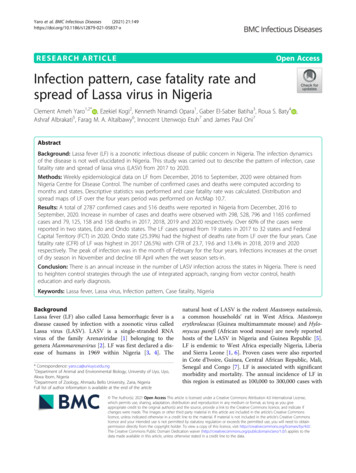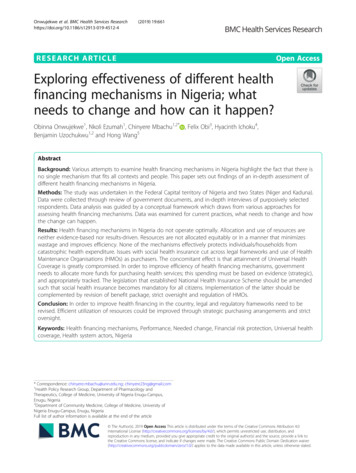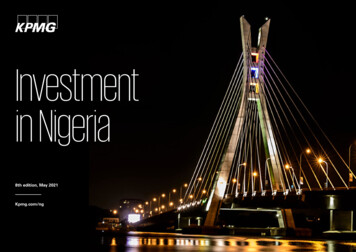
Transcription
Investmentin Nigeria8th edition, May 2021Kpmg.com/ng
Contact AddressLagos, NigeriaKPMG TowerBishop Aboyade Cole StreetVictoria Island, LagosTel: 234-1-4632090-3; 234-1-2718955 234-1-2718599; Fax: 234-1-4621218Abuja, Nigeria84, Kwame Nkrumah CrescentAsokoro, AbujaTel: 234 704 527 6101For further information, please contact:Kunle ElebuteNational Senior PartnerTel: 234-1-280-9267Mob: 234-803-402-0970Email: kunle.elebute@ng.kpmg.comTola AdeyemiPartner and Head, AuditTel: 234-1-2805317Mob: 234-803-2001746Email: tola.adeyemi@ng.kpmg.comVictor OnyenkpaCOO/Risk Management PartnerTel: 234-1-271-8935Mob: 234-803-406-5246Email: victor.onyenkpa@ng.kpmg.comWole ObayomiPartner and Head,Tax, Regulatory & People ServicesTel: 234-1-271-8932Mob: 234-803-402-0946Email: wole.obayomi@ng.kpmg.comJoseph TegbePartner and Head, Advisory ServicesTel: 234-1-280-5335Mob: 234-803-402-0989Email: joseph.tegbe@ng.kpmg.comKPMG accepts no liability or responsibility for reliance by any party on the contents of this publication.KPMG Professional Services and KPMG Advisory Services, partnerships registered in Nigeria and amember firm of the KPMG global organisation of independent member firms affiliated with KPMGInternational Limited, a private English company limited by guarantee. 2021 All rights reserved.Investment in Nigeria Guide - 8th Edition2
ContentsPreface . 3Chapter One . 71. The Country and its institutions . 81.1 Area and Population . 81.2 International Affiliations . 81.3 The Government . 101.4 Federal Ministries, Departments and Agencies . 111.5 Other Regulatory Agencies . 201.6 Economic Overview . 21Chapter Two . 222. Business Organisation and Regulation . 232.1 Sole Proprietorship . 242.2 Partnerships . 242.3 Incorporated Companies . 252.4 Incorporation . 252.5 Members, Shareholders and Types of Shares . 272.6 Shareholders’ Meetings . 282.7 Annual Returns . 282.8 Directors and Officers . 282.9 Dividends . 282.10 Bonus (Scrip) Issue . 292.11 Statutory Books of Account . 292.13 Patents, Designs, Trademarks and Copyrights . 292.14 Coastal and Inland Shipping (Maritime Cabotage) . 29Chapter Three . 313. Labour and Social Security Regulations . 313.1. Legislation . 323.2. Labour Unions . 323.3. Employers’ Organisations . 323.4. Trade Disputes . 323.5. Termination of Employment/ Suspension of Employees . 333.6. Minimum Wage . 333.7. Industrial Training Fund (ITF) . 333.8. Factories Act . 343.9. Employee’s Compensation Act (ECA) . 343.10. National Salaries, Incomes and Wages Commission . 343.11. Employment of Expatriates . 353.12. Contributory Pension Scheme (CPS) . 363Investment in Nigeria Guide - 8th Edition
Chapter Four . 374. The Nigerian Financial Services Industry . 374.1 Money Market . 384.2 Capital Market . 40Chapter Five . 425. Tax System . 425.1 Companies Income Tax (CIT) . 445.2 Personal Income Tax (PIT) . 525.3 Petroleum Profits Tax (PPT) . 555.4 Value Added Tax (VAT) . 565.5 Withholding Tax (WHT) . 585.6 Capital Gains Tax (CGT) . 595.7 Luxury Tax . 59Chapter Six . 616. Foreign Exchange Transactions . 616.1 Inter-bank Foreign Exchange Market (IFEM) . 626.2 Foreign Currency Domiciliary Accounts . 626.3 Remittance of Profits and Repatriation of Capital . 636.5 Royalty Payments . 636.6 Consultancy Fees . 636.7 Personal Home Remittance by Expatriates . 636.8 Demurrage . 646.9 Foreign Mortgages . 64Chapter Nine . 769. Importation of Goods . 769.1 Import Prohibition List . 779.2 Destination Inspection (DI) . 779.3 Payment Procedures . 779.4 Current Guidelines for Imports into Nigeria . 779.5 Marine Insurance . 789.6 Import Duties . 799.7 Temporary Importation . 79Chapter Ten . 8010. Exportation of Goods . 8010.1 Registration of Exporters . 8110.2 Export Procedures and Documentation . 81Chapter Eleven . 8211. COVID-19 - Economic and Fiscal Measures . 8211.1 Passage of the Finance Act, 2020 . 8311.2 Economic Measures . 8311.3 Fiscal Measures . 84Appendix 1 . 86Appendix 2 . 89Appendix 3 . 100Chapter Seven . 657. Investment in Nigeria . 657.1 Exemption from Incorporation . 667.2 Investments and Securities Act . 667.3 Nigerian Investment Promotion Commission (NIPC) Act . 667.4 Federal Competition and Consumer Protection Act, 2018 . 677.5 Investment Incentives . 677.6 Doing Business in Nigeria . 71Chapter Eight . 738. Accounting and Auditing Requirements . 738.1 Accounting Records . 748.2 Financial Statements . 748.3 Audit Requirements . 74Investment in Nigeria Guide - 8th Edition4
PrefaceThis publication sets out the basic information on tax and business regulatoryissues that new investors need to know when investing in Nigeria. It alsoprovides information about the country, its institutions and infrastructure. Wehave updated the publication with changes in the tax and business regulatoryenvironment since May 2019 when the last edition was published.The information contained in this publication is intended to be of generalinterest to the reader and it does not address the circumstances of anyindividual or entity.Although the contents of the publication are correct to the best of ourknowledge and belief at the time of going to press, readers are encouragedto seek specific professional advice before taking any action on the basis ofopinions expressed.We disclaim any responsibility whatsoever for any loss or damage suffered byany person on account of reliance on this publication.Lagos, NigeriaApril 20215Investment in Nigeria Guide - 8th Edition
egendNorth Cental RegionNorth East RegionNorth West RegionSouth East RegionBightofBonnySouth South RegionSouth West RegionInvestment in Nigeria Guide - 8th Edition6
ChapterOne:The Country and itsinstitutions7Investment in Nigeria Guide - 8th Edition
The Country and itsinstitutions1.1Business Organisationand RegulationLabour and SocialSecurity RegulationsThe Nigerian FinancialServices IndustryTax SystemForeign ExchangeTransactionsArea and PopulationNigeria became independent in 1960, having been under British colonial rule since1861. The country is situated on the West Coast of Africa, some 649 km northof the Equator, and has a total land area of approximately 923,768 sq. km1. It isbordered to the north by Niger, to the east by Chad and Cameroon, to the south bythe Gulf of Guinea and to the west by the Republic of Benin.1.2Investment in NigeriaAccounting andImportation of GoodsAuditing RequirementsExportation of GoodsCOVID-19 - Economicand Fiscal MeasuresInternational AffiliationsNigeria is affiliated to the following international organisations:1.2.1African UnionNigeria is one of the founding members of the African Union (AU),formerly Organisation of African Unity, which was established in May1963. Nigeria supports the AU and has been an active member in thisprimary African political group. The creation of the AU brings the dream ofa common African currency, foreign policy, defence structure and economicprogramme closer to reality. While some of the official bodies of AU(such as Pan-African Parliament, African Central Bank, Regional EconomicCommunities, and African Court of Justice) are not yet fully operational, AUhas successfully launched the Africa Continental Free Trade Agreement tobreak down the barriers to intra-Africa trade. Nigeria became a signatory tothe Agreement on 7 July 2019 after it came into force on 30 May 2019.The last census conducted in March 2006 estimated the country’s population tobe One Hundred and Forty Million, Three Thousand, Five Hundred and Forty-Two(140,003,542)2. The population of Nigeria has been growing at about 2.53% perannum and is projected to reach two hundred and nineteen million, four hundredand sixty-three thousand, eight hundred and sixty-two (219,463,862) by July 20213.1.2.2Economic Community of West African States (ECOWAS)Nigeria is one of the founding members of ECOWAS, an economic group of15 West African States established in May 1975 to facilitate trade betweenthe States in the region and to promote regional joint development efforts.ECOWAS is one of the eight Regional Economic Communities of the AU.In January 1990, ECOWAS commenced a Trade Liberalisation Scheme (TLS)aimed at the total elimination of customs duties and taxes of equivalenteffect, removal of non-tariff barriers and the establishment of a commonCustoms External Tariff (CET) to protect goods produced in Member States.Nigeria and other ECOWAS Member States adopted the CET in 2015.Aside from the TLS, six ECOWAS Member States (The Gambia, Ghana,Guinea, Nigeria, Liberia and Sierra Leone) intend to adopt a commoncurrency called the ECO, which was scheduled to be launched in 2020.However, the introduction of the ECO has been extended by three to fiveyears due to the impact of the COVID-19 pandemic on the Member States’economies 4.1 -factbook/geos/ni.html2 http://www.nigerianstat.gov.ng/3 igeria/#: :text populous%20country4 In September 2020, it was announced at the 57th ordinary session of the Conference of Heads of State and Government of ECOWAS thatthe ECO is scheduled for implementation “within three to five years.”. The implementation of the ECO has been delayed due to the impactof the coronavirus pandemic on member countries. vestment in Nigeria Guide - 8th Edition8
The Country and itsinstitutions1.2.3Business Organisationand RegulationLabour and SocialSecurity RegulationsThe Nigerian FinancialServices IndustryTax SystemForeign ExchangeTransactionsNew Partnership for Africa’s Development (NEPAD)Investment in Nigeria1.2.5The main organs of the NEPAD are the Heads of State and GovernmentImplementation Committee (HSIC) and the Steering Committee of NEPAD.The HSIC comprises 3 States per AU region, while the Steering Committeecomprises the Personal Representatives of the NEPAD Heads of State andGovernment.Nigeria is a member of The Commonwealth together with the majority ofother nations that once constituted the British Empire.Organisation of Petroleum Exporting Countries (OPEC)Nigeria has remained a very active member of the oil cartel, since joiningthe organisation in 1971. Nigeria is the 10th largest producer of petroleumin the world, the 7th largest exporter and has the 10th largest provenreserves5.1.2.6Other International AssociationsNigeria is a member of the World Trade Organisation (WTO), which focuseson promoting free trade among nations. Nigeria is also a member of theUnited Nations (UN) and plays an active role in its peace-keeping activitiesglobally.5 2020 OPEC Annual Statistical Bulletin9Investment in Nigeria Guide - 8th EditionCOVID-19 - Economicand Fiscal MeasuresOPEC’s mission is to co-ordinate and unify the petroleum policies ofMember Countries and ensure the stabilisation of oil prices in order tosecure efficient, economic and regular supply of petroleum to consumers,a steady income to producers and a fair return on capital to investors in thepetroleum industry.NEPAD is structured into various task teams which are responsible forinvestigating priority areas such as: conflict prevention, managementand resolution; political and economic governance; market access (i.e.,promotion of intra-African trade and increased access to markets ofindustrialized countries); development of agriculture; development ofhuman resources; and provision of key infrastructure to facilitate subregional and continental integration (e.g., information communicationtechnology, energy, transport and water).The CommonwealthExportation of GoodsOPEC is a permanent, inter-governmental organisation created at theBaghdad Conference on 10 to 14 September 1960 by Iran, Iraq, Kuwait,Saudi Arabia and Venezuela. The five founding members were later joinedby eleven other Members: Qatar (1961 to 2019), Indonesia (1962–2008),Libya (1962), United Arab Emirates (1967), Algeria (1969), Nigeria (1971),Ecuador (1973 to 2019), Gabon (1975) Angola (2007), Equatorial Guinea(2017), and Congo (2018).Nigeria is an active member of NEPAD, an agency of the AU whose mainobjective is to give impetus to Africa’s development, by bridging existinggaps between Africa and the developed world.1.2.4Accounting andImportation of GoodsAuditing Requirements
The Country and itsinstitutions1.3Business Organisationand RegulationLabour and SocialSecurity RegulationsThe Nigerian FinancialServices IndustryTax SystemForeign ExchangeTransactionsThe GovernmentAt independence in 1960, Nigeria consisted of three regions: the Western, Easternand Northern Regions. In 1963, the Western Region was split into two regions,namely: the Western and Mid-Western Regions. In 1967, the four regions weresplit into 12 States, after which there was a civil war, arising from a military coupand counter coup. In 1976, 7 additional States were created, resulting in a total of19 States. The number of States was increased to 21 on 23 September 1987, and9 more States were created in September 1991, to make the country a federationof 30 States. Currently, there are 36 States in Nigeria following the creation of 6additional States on 1 October 1996.Nigeria was under military rule from 1966 to October 1979, when the militarygovernment handed over power to a civilian administration. The civilianadministration governed for four years, based on a US-type Presidential System ofgovernment, before it was toppled by a military coup on 31 December 1983. Thearmy ruled the country from then until 29 May 1999 when they voluntarily handedover power to a democratically elected civilian government. This has been followedby elections in 2003, 2007, 2011, 2015 and 2019. The current Head of State isPresident Muhammadu Buhari, GCFR, who was sworn in on 29 May 2019 for asecond term of four years.1.3.1The PresidencyThe President is the Head of State and Commander-in-Chief of the ArmedForces. He is elected for a four-year term, subject to a maximum of 2terms. There is a Vice President, who is elected alongside the President.The Vice President may be empowered to act on behalf of the President, ifhe is unable to act.1.3.2National AssemblyThe National Assembly is the legislative arm of the Federal Government. Itcomprises the Senate (Upper House) and the House of Representatives(Lower House). The Senate is headed by a Senate President, who iselected from among the Senators. The Senate is made up of 3 memberseach from the 36 States of the Federation, plus 1 member representing theFederal Capital Territory, Abuja.Apart from making laws, the Senate is empowered to approvecertain political appointments proposed by the President. The Houseof Representatives comprises members elected from the FederalConstituencies in each State of the Federation. The House is headed by aSpeaker, who is elected from among the members.Investment in Nigeria1.3.3Accounting andImportation of GoodsAuditing RequirementsExportation of GoodsCOVID-19 - Economicand Fiscal MeasuresLegal SystemThe Nigerian legal system is modelled after the English Common Law,modified by statutes to meet local demands and conditions. Nigerian lawsin areas such as patents, trademarks, copyrights and business associations,considerably reflect corresponding British statutes in these areas as at thedates of their first enactment.At the apex of the Nigerian judicial system is the Supreme Court,which presently consists of 13 Justices including the Chief Justice. TheSupreme Court of Nigeria has original and appellate jurisdiction in certainconstitutional, civil and criminal matters prescribed in the Constitution.There is also a Court of Appeal which hears appeals from the FederalHigh Court, High Court of a State, Sharia Court of Appeal of a State andCustomary Court of Appeal of a State.Under the Constitution, the Federal High Court has jurisdiction in mattersconnected with the revenue of the Government of the Federation,admiralty, banking, foreign exchange and other currency and monetaryor fiscal matters. At the State level, there is the High Court that hasjurisdiction to hear and determine both civil and criminal proceedings.A Customary Court of Appeal of a State exercises jurisdiction in civilproceedings involving questions of customary law. A Sharia Court ofAppeal has jurisdiction in cases involving questions of Islamic law.There are Magistrates’ Courts in the States, which have original jurisdictionin civil and criminal matters specified in the appropriate legislation.“At the apex of the Nigerian judicialsystem is the Supreme Court,which presently consists of 13Justices including the Chief Justice.The Supreme Court of Nigeria hasoriginal and appellate jurisdictionin certain constitutional, civil andcriminal matters prescribed in theConstitution.”Investment in Nigeria Guide - 8th Edition10
The Country and itsinstitutions1.4Business Organisationand RegulationLabour and SocialSecurity RegulationsThe Nigerian FinancialServices IndustryTax SystemForeign ExchangeTransactionsFederal Ministries, Departments and AgenciesInvestment in Nigeria1.4.3The Federal Government functions through a network of ministries, departments,statutory corporations (parastatals), authorities, boards and agencies, some ofwhich are listed below.1.4.1Federal Ministry of Industry, Trade and InvestmentThe Ministry issued the Minerals and Mining Regulations in 2011, (“theRegulations”) pursuant to the Minerals and Mining Act. The Regulations isintended to establish a more co-ordinated and accountable solid mineralssector in the country and stamp out the discretionary grant of mineral titles.The Steel Department of the Ministry is responsible for the enhancementand development of the steel industry in Nigeria. The Government isencouraging private investment in the sector, in line with its economicpolicies and the Nigeria Industrial Revolution Plan.11Investment in Nigeria Guide - 8th EditionFederal Ministry of Petroleum ResourcesIt is expected that the Ministry of Petroleum Resources, agencies andparastatals and, in fact, the entire Nigerian petroleum industry will undergosignificant reform under the Petroleum Industry Bill when it is passed intolaw.Federal Ministry of Mines and Steel DevelopmentThe opportunities which Nigeria offers investors in the field of non-oil exportare immense. In March 2007, the National Assembly enacted the Mineralsand Mining Act to promote investments in the sector. Under the Act,mining companies are entitled to the following incentives among others: aninitial three-year tax holiday, which may be renewed for an additional twoyears; capital allowance of 95% on qualifying capital expenditure in the firstyear the mining investment is incurred; and exemption from customs andimport duties in respect of plant, machinery, equipment and accessoriesimported specifically and exclusively for mining operations.COVID-19 - Economicand Fiscal MeasuresThe NNPC is the statutory corporation through which the FederalGovernment participates in the Nigerian oil and gas industry. It overseesthe Federal Government’s investments and interests in the joint venturesand production sharing contracts. The NNPC owns and managesprocessing, storage and distribution infrastructure, marketing outlets andassociated infrastructure in the country.The activities of the Ministry are complemented by the Nigerian InvestmentPromotion Commission (NIPC) through which several investmentincentives, such as pioneer status, are administered.The Mines Department of the Federal Ministry of Mines & SteelDevelopment is charged with the supervision of the prospecting, mining,exploitation and development of, and trade in, Nigeria’s mineral resourcesother than oil and natural gas. Its mandate also includes research,exploration and development of solid minerals in the country. Due to heavydependence on petroleum, the Government has expressed its commitmentto developing the solid minerals sector as a means of diversifying theeconomy.Exportation of GoodsThe Federal Ministry of Petroleum Resources is responsible for theformulation, determination and monitoring of Government policy for thepetroleum industry in Nigeria. The Ministry also regulates the industrythrough parastatals like the Nigerian National Petroleum Corporation(NNPC), the Department of Petroleum Resources (DPR) and the PetroleumProducts Pricing Regulatory Agency (PPPRA).This Ministry has general responsibility for commercial, industrial, andinvestment related affairs of the Federal Government, such as traderelations with foreign countries, internal and regional trade, industrialpolicies, investment incentives, and registration of trademarks and patents.1.4.2Accounting andImportation of GoodsAuditing Requirements1.4.4Federal Ministry of Works and Housing (FMWH)The FMWH and its parastatals for the formulation and administration ofpolicies relating to:i.Planning, engineering design, construction and rehabilitation,monitoring and maintenance of Federal roads, highways and bridges,and surveying and mapping Nigeria’s internal and internationalboundaries.ii. National lands and housing, urban development programmes andplans, and the supervision of the Federal Housing Authority and FederalMortgage Bank of Nigeria.1.4.5Federal Ministry of Finance, Budget and National Planning (FMFBNP)The FMFBNP formulates economic and fiscal policies and co-ordinates thefinancial affairs of the Government, including annual budgets. Until June2007, when the Federal Inland Revenue Service (Establishment) Act wasenacted, the FMFBNP oversaw
Investment in Nigeria Guide - 8th Edition 8 1.2.3 New Partnership for Africa's Development (NEPAD) Nigeria is an active member of NEPAD, an agency of the AU whose main
